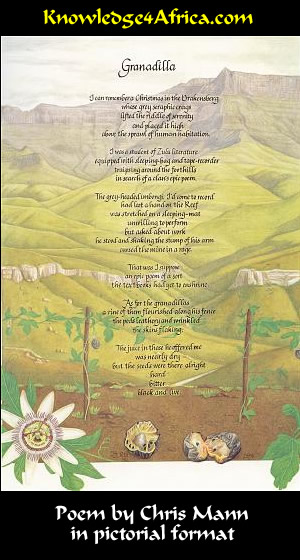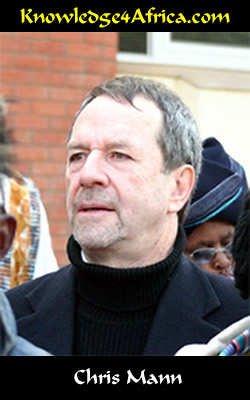|
READ THIS
The poet, while hitching a ride, gets to talking with the driver who tells him how he often speaks to the
shades -- the spirits of his ancestors -- and how they help him.
The poet is then left to ponder the shades. What is their role in life? How should one honour them?
 ABOUT THE POET
ABOUT THE POET
Chris Mann was born in Port Elizabeth in 1948. He spent many years in rural and semi-rural KwaZulu
Natal engaged in development work, during which time he became imbued with the spirit of rural South
Africa.
In the mid-1990s he moved to Grahamstown where he became associated with the Grahamstown
Foundation and Rhodes University.
Mann is a multi-faceted poet whose major concern is the increasing exclusivity and inaccessibility of
poetry. His work is therefore not only for the printed page but also for multimedia performances.
Much of his work is in association with Julia Skeen who produces graphic images for many of his poems.
In this way he could perhaps be compared to William Blake whose poetry should also often be viewed in
a wider graphic forum and not merely in the isolation of the printed page.

"In praise of the shades" looks at what has been described as "an indigenous knowledge
system" that flourishes among many people in Southern Africa.
Mistakenly called "ancestor worship", its nearest Western equivalent is possibly the Catholic
Church's veneration of the saints which offers the life and works of the holy people of the past for our
enrichment and inspiration.
Since these ancestors still exist in the afterlife where, because of their proven holiness, they carry
considerable power of intercession with God, the Church offers their veneration as another dimension to
our contact with the world of the spirit.
"In praise of the shades" explores in a simple yet graphic way the vital role of the shades in guiding
our complex lives in a modern scientific and urban society.
Both the wording and vision of the poem is strongly South African. Indeed, the poem explores a vital force
within this multi-dimensional community.
Have you looked at the questions
in the right column?
|
TEST YOURSELF!
Read the left column and then answer
the following questions:
Before you even begin to answer these questions, why don't you take time off to get in touch with your own
shades? Do they tell you anything?

[Need help?]
Many wise and very successful people suggest that one should do something like this by creating what
is called a Council of Light to give you advice.
You could have anyone on this Council: your own ancestors or shades -- for example, a deceased father
or grandmother -- or someone like Mandela, Churchill, the Buddha, Jesus Christ or Mother Theresa.
One should always look for someone who has had a positive impact on the world. It would not be sensible
to put Hitler or Stalin on your Council of Light.
|
I met a man with rolled-up khakhi sleeves,
who told me his faults, and then his beliefs.
- Comment on the visual effect that is contained in the words, "who told me his faults, and then his
beliefs". (4)

[Need help?]
The driver is coming away from church on Sunday, isn't he? (Or is he?)
Nevertheless, it would appear that the poet is using a religious image here. In a Catholic service, for
example, the congregation is asked to examine their consciences, find their faults and sins, and confess
them.
After this comes their act of faith, the expression of their belief in God and the Church.
The scene in the bakkie is therefore dressed in religious imagery, as if a church service were being
enacted, with its confession of sins followed by a proclamation of belief.
Then, in stanzas 4 to 7, comes the sermon -- the discussion of the world of the shades.
One could argue, therefore, that the form of the poem is a religious service:
- the examination of conscience and proclamation of faith (stanza 1 to 3);
- the sermon (stanza 4 to 7).
|
His bakkie rattled a lot on the ruts,
so I'm not exactly sure what he said.
- Examine the poetic devices found in the words "his bakkie rattled a lot on the
ruts". (4)

[Need help?]
Notice the use of onomatopoeia in these words, depicting the rattling of the bakkie through the
sound of the words.
The poet achieves this rattling effect by the selection of words which consist of short, sharp syllables.
|
He lowered his voice, and spoke about his shades.
This meant respect, I think, not secrecy.
- Why does the poet need to talk about "respect" and "secrecy"? (4)

[Need help?]
There is a conflict between White and Black culture about what is meant by "good manners".
For Whites, the lowering of one's voice indicates "respect" whereas talking loudly is seen as
"rudeness".
For Black culture, on the other hand, the exact opposite is true. Lowering one's voice and talking softly
means that one is "harbouring secrets". Talking loudly can then be viewed as polite because it
assures people that one is not harbouring secrets.
When the driver lowers his voice and talks softly, it could therefore be interpreted as secrecy. The
passenger, however, sees immediately that this is not so. The driver's lowered voice is rather an
indication of respect.
Of course, the fact that the driver and the hitch-hiker are alone in the bakkie would add to the notion that
the driver is being respectful and is not being secretive.
|
He'd always asked them to guide him.
- In what way, according to the poet, would the shades be able to guide the driver's
life? (4)

[Need help?]
The poet means of course guidance through life, guidance through violence, injustice and despair.
But the mechanism for such guidance would be through the words of children and adults, through
information contained in books.
Words of living beings -- mortals -- and messages in books are therefore the vehicle by which the
shades can reach and inform us.
|
He seemed to me a gentle balanced man.
- Why does the poet feel it necessary to say that? (4)

[Need help?]
One tends to be regarded as being somewhat deranged if one believes differently from the rest of society.
If, for example, one goes down the road of Kabbalah -- as Madonna has done -- one's friends begin
to feel uncomfortable.
In the same way, the driver would be regarded by many a person as being unbalanced, stupid -- even
dabbling in Satanism -- for accepting the shades and especially for allowing the shades to direct his life.
The poet, therefore, hastily points out that this is not so, that the driver is a "gentle balanced man"
and that there is nothing at all odd about him.
|
The first three stanzas are very conversational.
- Why is this so? How does the poet achieve this effect? (4)

[Need help?]
The first three stanzas describe a conversation which occurs in the bakkie. The poet therefore takes on
a conversational tone to depict what he is describing.
The final four stanzas, on the other hand, are different. They are more philosophical, contain more of a
message, are more like a sermon in a church. The conversational tone therefore disappears.
The poet achieves this conversational tone by his very simple vocabulary, his colloquial usage, his
description of the everyday things that one would see on a leisurely Sunday afternoon drive through the
platteland.
This, however, changes in Stanza 4, where the message becomes more philosophical and the vocabulary
controlled and directed towards the message.
Be able to find examples of all this.
|
What messages do the shades leave us? (4)

[Need help?]
The message from the shades is: "You are not what you think you are".
This is a deeply philosophical concept that forms the basis of many a philosophical treatise, some novels
and even some movies -- like The Matrix.
The great Greek philosopher, Plato, expressed this concept in his debate on the world of ideas. The world
we see, Plato wrote, is not the real world.
This too is the message of the shades. The world you see is not the real world at all. Communicating with
the shades, however, will give us some idea of that real world and will enrich our understanding of it.
|
The poet makes it clear that the shades cannot be equated with gods.
- How does he make this clear? (4)

[Need help?]
Is it not true that gods are spirits who live entirely in the spirit world? One can never scold or chastise a
god. On the other hand, one can profane a god.
Neither of these is true of the shades, says the poet. One cannot profane a shade but one can indeed
scold them.
The shades, therefore, are more like mortals who are living in a spirit world than gods appearing in our
mortal world.
|
When all I ever hear about these days
is violence, injustice, and despair,
or worse than that, humourless theories
to rescue us all from our human plight.
- Why should the "humourless theories" be worse than "violence, injustice, and
despair"? (4)

[Need help?]
Is it not because violence, injustice and despair destroy the body whereas humourless theories destroy
the soul?
These "humourless theories" are the thoughts of science and religion which brook no opposition,
which aim at controlling the mind.
|
- What does the poet mean by the term "humourless theories"? (4)

[Need help?]
The theories are humourless because they are not meant to be laughed at. Indeed, one gets ostracised
or shunned for daring to believe otherwise.
For some fifty years in South Africa, the accepted humourless theory was that of apartheid, and people
who publicly repudiated the idea could be arrested merely for holding a contrary belief.
The same was true for communism in Russia. And just try proclaiming belief in evolution or Buddhism
within a fundamentalist Christian community! You will be ostracised.
|
Those moments in a bakkie on a plain
make sunflowers from a waterless world.
- Explain carefully what the poet means when he concludes the poem in this way. (4)

[Need help?]
Literally, the poet is travelling through a world of winter drought but where sunflowers are growing
"green and firm".
The poet thereupon transfers this image to his conversation with the driver. The world in which the driver
lives is also waterless, full of "violence, injustice, and despair", where the souls of humanity are
destroyed by "humourless theories".
Yet the conversation within that bakkie causes sunflowers of wisdom and joy to pop up in the poet's mind.
|
|




